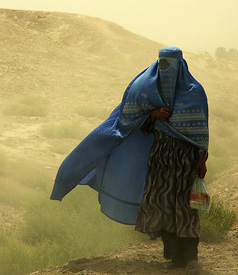 Between the Bomb and the Burqa
Between the Bomb and the BurqaSunday 08 August 2010
by: Yana Kunichoff and Mike Ludwig, t r u t h o u t | News Analysis
Her voice was thick with passion as she argued for ending violence against fellow Afghan women, but the men didn't listen. Instead they hurled insults at her; they called her a prostitute and a traitor to her religion. The stubborn men's insults were abusive and frustrating, but it had been worse for other women in her position. They were threatened and hunted down. Some of them were killed.
Like many recent reports in the media, this story conjures up images of a brave Afghan villager struggling against the tyrannical rule of a Taliban court or insurgent militia, but that's not case: the woman in this story is an unnamed member of the Afghan Parliament supported by the United States. The verbal abuse is recounted by another female Afghan official in a recent Human Rights Watch (HRW) report. The men who called her a prostitute were her colleagues and fellow legislators, the supposed enemies of the religious fanatics fighting for control of Afghanistan.
~snip~
An internal Central Intelligence Agency (CIA) document released by WikiLeaks in March reveals a secret plan to use the plight of Afghan women and refugees in developing media strategies to "leverage French (and other European) guilt" during an especially bloody summer of military escalation. The confidential document was prepared by the Red Cell, a secretive group that consults the US intelligence community.
In response to the news that Dutch forces would soon withdraw from Afghanistan, the Red Cell outlined a plan to use Afghan women and refugees in developing media strategies to ensure that more NATO allies would not succumb to public pressure and follow suit. The memo claimed that a "not our problem" sentiment toward the Afghan conflict allowed European leaders to ignore voter's vast disapproval of the occupation, but "forecasts of a bloody summer" could provoke a public backlash.
The forecast was correct: June and July were the deadliest months for NATO and US forces to date. The record number of body bags coupled with the firing of former US Gen. Stanley McChrystal and the bloody revelations provided by the massive WikiLeaks release has pushed international support for the war to a new low.